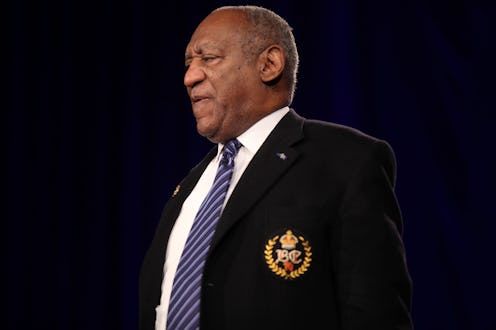Entertainment
Will Bill Cosby Stay a Pop Culture Icon?
Who knew something as innocuous as pudding would ever have its connotations thrown for a loop, but everything so tightly tethered to Bill Cosby will be from here on out usurped by thought and mention of the accusations of rape and sexual abuse that the longstanding comedian has encountered over the past several years. As Lindy West illustrates on GQ, the allegations institute a practical “That’s all, folks!” to a career that was already — despite the name of Cosby’s 2013 comedy special Far From Finished— fast approaching its end. And West seems to be right: Netflix canceled the Cosby comedy special it was producing. His Late Show appearance was canceled. NBC has pulled the plug on its Cosby sitcom. West says without hesitation that, in light of the many assertions of the man’s crimes, there is no future for Cosby. But will there still be a past?
Long relegated as a beacon for quotes and references from his golden run in the '80s, the Cosby of today was hardly a relevant matter even before these troubling stories resurfaced. By virtue of the slowing career that inherently comes with a passing into one’s later years, we have seen far less of Cosby lately. And what we have seen, as West details in her article, really doesn’t have much of a place in today’s culture anyhow: “Cosby significantly changed white America's perceptions of black families. But Cosby's views on race and politics are offensive and regressive in 2014.” West likens the “victim blaming” of his racially themed comic routines to the mentality that often charges discussions of sexual abuse, in fact.
Perhaps this artistic dissipation explains why we have not seen the same sort of cries in defense of Cosby’s reputation that we witnessed earlier this year following similar accusations against Woody Allen. When we see two men of the same age, vocation, and degree of influence met with such a vast difference in public appeal following indictments of rape and sexual abuse — all in the same year, no less — what can we cite as the reason for the disparity? Is it a matter of evidence? Of more than a dozen women coming out against one man in contrast to a single woman accusing the other? Can the differences marked by the public's reactions be, in fact, relevant to one’s continued contributions to the creative spectrum in opposition to the other’s effective absence thereof? Or — yes, it’s really something we might want to bear in mind — is it a racial issue?
Of course, none of these quandaries is brought up in the interest of helping Cosby’s case, or implying that he deserves all or any of the benefits inscrutably afforded to Allen throughout his stay in the entertainment news circuits' intrigue. They are all mentioned, instead, to continue the discussion of where Cosby stands in the pop-culture eye. If Allen (whose filmography, let's face it, has had as many misses as it’s had hits lately) can evade the ramifications of as jarring an allegation as one might imagine, why does West project that it’s all over for the former sitcom star and stand-up comedian?
It’s a tough question to answer — one that may well draw from any of the issues suggested above. And while the context of the charges, his lapsed contributions to the zeitgeist, and society’s incongruous attitudes on the spectrum of race might all come into play in casting Cosby out of pop culture’s good graces forever, it might well also have to do, quite simply, with who we think Cosby is. He’s, above all else, Cliff Huxtable. He’s the brains behind Fat Albert. He’s the stand-up comedian famous for eschewing foul language in favor of funny faces and voices. He’s the guy with the pudding, the man with the sweaters, the effective epitome of The Dad.
And these ideas are not reconcilable with this new view of the man as a sex criminal and a rapist. While I do firmly believe that an artist’s work should, and can, be judged independently of his or her identity — one should feel invited to watch and appreciate the works of Allen, Roman Polanski, or even Paul Reubens as he or she otherwise might (the issue of the financial support for these artists that might derive from subsisted viewings is a separate question) — I can also recognize the difficulty that comes in doing so, especially when the image presented onscreen by the figure in question is so damn wholesome.
If it’s difficult for any of us to return to Manhattan or Chinatown, it’ll be doubly so to watch Cliff babbling around the living room with Claire, Theo, and Rudy. Inevitably, TVLand reruns will breed sour taste, stand-up routines will feel suddenly less quotable, and references to Jell-O products will give way to a far more regrettable excuse for comic material; it’s not a particularly optimistic promise, but comedy will seize the subject matter for its own devices, no doubt.
Cosby may have already had little hope for a fruitful future in pop culture. But now, we can hardly see his past staying in the picture either.
TVLand, Hulu+, and Comedy Central all either syndicate, or are planning, Cosby shows or specials, and Bustle has reached out for comment on their plans for the future of these shows.
As for Cosby, his lawyer released the following statement on Sunday:
Over the last several weeks, decade-old, discredited allegations against Mr. Cosby have resurfaced. The fact that they are being repeated does not make them true. Mr. Cosby does not intend to dignify these allegations with any comment. He would like to thank all his fans for the outpouring of support and assure them that, at age 77, he is doing his best work. There will be no further statement from Mr. Cosby or any of his representatives.
Images: Getty (3); NBC
